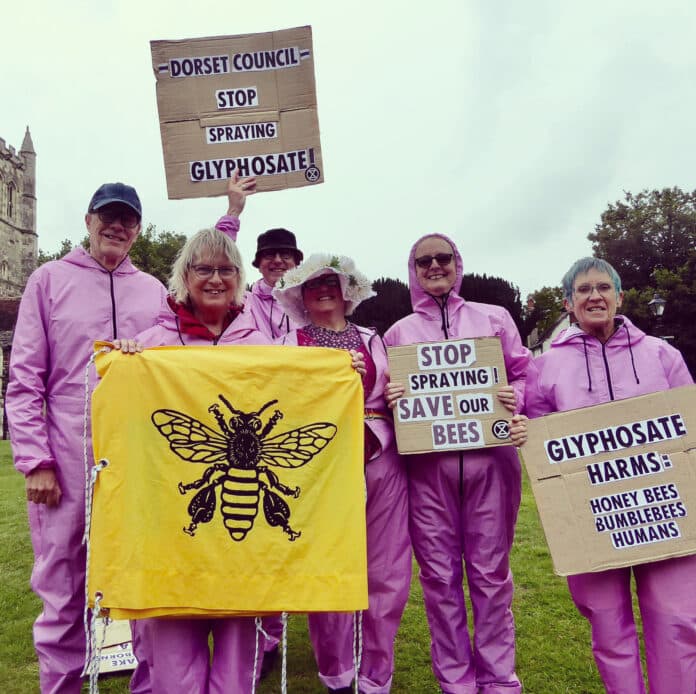XR Wimborne unfurled banners, held placards, handed out hundreds of leaflets and made lots of new friends in their glyphosate protest in town today – Dorset Council stop spraying, save our bees pic.twitter.com/itGPl7N3bm
— EXTINCTION REBELLION LONDON ACTIONS (@XR_LondonRebels) July 23, 2023
Members of Extinction Rebellion Wimborne staged a colourful protest in Wimborne at the weekend to raise awareness of Dorset Council spraying glyphosate on roads, pavements and SANGs. They held banners reading, “Stop Spraying, Save Our Bees” and “Glyphosate Harms Honey Bees, Bumblebees, Humans”. They also unfurled a banner, “Nature is Dying, Act Now”.
“We live in one of the most nature depleted countries on the planet,” said local resident, Professor James Bullock. “Glyphosate destroys nature. It kills plants indiscriminately, harms bees and it gets into our waterways. Nature in the UK is under great stress, experiencing huge declines in insects, birds and wildlife in general. Nature needs a home and our towns and gardens must serve as a haven for wildlife. And contrary to what you may have been led to believe, glyphosate does not break down into a harmless byproduct but into AMPA which is toxic to aquatic life e.g plants and fish.”
Local resident Joanna Bury said, “Worryingly, glyphosate – also known as Roundup – is considered by the World Health Organisation to be a probable cause of cancer in humans. Recent studies have found that 80 percent of adults and children have glyphosate in their urine.”
The Pesticide Action Network is promoting “Pesticide Free Towns”. The first was Glastonbury and has been followed by dozens more. Dorset examples include Shaftesbury and Lyme Regis. Many councils across Europe have moved away from using pesticides, demonstrating that it is possible.
On its website the Pesticide Action Network mentions many alternatives to the use of pesticides including heat treatment, mechanised hoes, strimming, hand weeding, acetic acid solutions, steel brushing, high pressure hot water.
Facebook https://www.facebook.com/XRWimborne/
Instagram https://www.instagram.com/xrwimborne/
Twitter https://twitter.com/XRWimborne
LINKS:
UK one of most nature depleted countries https://www.wwf.org.uk/future-of-uk-nature
Glyphosate kills important microorganisms
Glyphosate Kills Microorganisms Beneficial to Plants, Animals, and Humans
Glyphosate kills amphibians
https://esajournals.onlinelibrary.wiley.com/doi/10.1890/04-1291
Glyphosate causing bird decline
https://www.theguardian.com/environment/2023/feb/06/garden-pesticides-british-songbird-decline-study
Glyphosate damages bees
Glyphosate breaks down into harmful AMPA
https://www.sciencedirect.com/science/article/pii/S0147651322009952
WHO – Glyphosate probable cause of cancer
https://www.iarc.who.int/featured-news/media-centre-iarc-news-glyphosate/
Glyphosate in urine – cancer
https://www.theguardian.com/us-news/2023/jan/20/glyphosate-weedkiller-cancer-biomarkers-urine-study
Pesticide Free Towns
Pesticide-Free Towns – success stories
Alternatives to Pesticides
http://pan-uk.org/pesticide-free/
Pesticide reduction across Europe
Join us in helping to bring reality and decency back by SUBSCRIBING to our Youtube channel: https://www.youtube.com/channel/UCQ1Ll1ylCg8U19AhNl-NoTg and SUPPORTING US where you can: Award Winning Independent Citizen Media Needs Your Help. PLEASE SUPPORT US FOR JUST £2 A MONTH https://dorseteye.com/donate/







